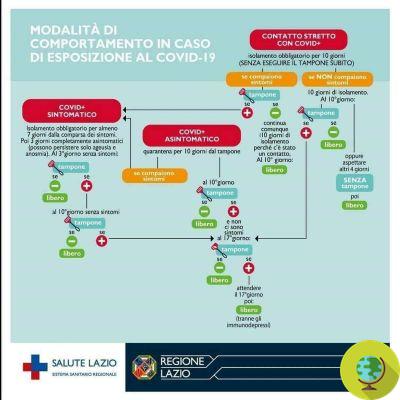What is the best behavior to follow? What is the difference between isolation and quarantine? And what are the "close contacts"?
Don't store avocado like this: it's dangerousIn the midst of decrees and provisions, there remains a single question to most people: what should I do if I come into contact with a positive person? With the growing spread of infections, alas, there are more and more those who can easily come into contact with subjects who have tested positive and therefore potentially contagious. What is the best behavior to follow? What is the difference between isolation and quarantine? And what are the "close contacts"?
The Circular of the Ministry of Health of 12 October actually updates the indications on the duration and termination of isolation and quarantine, in consideration of the evolution of the epidemiological situation, of the new scientific evidence and indications from the WHO and of the opinion formulated. by the Scientific Technical Committee.
Coronavirus, a new study explains why children become less infected and are less contagious
First, the circular clarifies a substantial difference between isolation e quarantine:
- theisolation of cases of documented SARS-CoV-2 infection refers to the separation of infected people from the rest of the community for the duration of the period of contagiousness, in an environment and conditions that prevent the transmission of the infection;
- la quarantine, on the other hand, refers to the restriction of the movement of healthy people for the duration of the incubation period, but who may have been exposed to an infectious agent or a contagious disease, with the aim of monitoring the possible appearance of symptoms and promptly identifying new cases.
Rapid test approved in schools to identify positives immediately (and avoid quarantine)
Index
What should I do if I have tested positive
In this case the Ministry makes a distinction between symptomatic positive cases e positive asymptomatic cases:
If you are an asymptomatic positive
Asymptomatic people who have tested positive for SARS-CoV-2 may return to the community after a period of isolation for at least 10 days from the appearance of positivity, at the end of which a molecular test is performed with a negative result.
So if you are positive but without symptoms: 10 days of isolation + test are needed;
If you are symptomatic positive
Symptomatic people who have tested positive for SARS-CoV-2 can return to the community after a period of isolation for at least 10 days from the onset of symptoms (not considering anosmia and ageusia / dysgeusia which may have prolonged persistence over time) accompanied by a molecular test with negative result performed after at least 3 days without symptoms (10 days, of which at least 3 days without symptoms + test).
Then:
- se you are positive with no symptoms: you will be in solitary confinement for 10 days, at the end of which you have to perform a molecular test
- if you are positive with symptoms: you will be in isolation for 10 days, at the end of which you must perform a molecular test with negative result after at least 3 days without symptoms (10 days, of which at least 3 days without symptoms + test)

© Lazio Region
What do I do if I am a "long-term positive"?
People who, although no longer presenting symptoms, continue to test positive for the molecular test for SARS-CoV-2, in case of absence of symptoms for at least a week (made exception for ageusia / dysgeusia and anosmia which can last for some time after healing), they will be able to stop isolation 21 days after the onset of symptoms.
A criterion that, as stated in the circular, "can be modulated by the health authorities in agreement with clinical experts and microbiologists / virologists, taking into account the immune status of the people concerned (in immunosuppressed patients the period of contagiousness can be prolonged)".
Close asymptomatic contacts
According to the provisions, the close contacts of cases with SARS-CoV-2 infection confirmed and identified by the health authorities, must observe (yes a "close contact" when one of the people you have been close to in the previous hours comes found positive for coronavirus):
- a 14-day quarantine period from the last exposure to the case;
- or a 10-day quarantine period from the last exposure with a negative antigen or molecular test performed on the tenth day.
In addition, the ministry recommends:
- carry out the molecular test at the end of the quarantine to all people who live or come into regular contact with fragile and / or at risk of complications;
- provide for differentiated access to the test for children;
- do not provide for quarantine or the execution of diagnostic tests in close contacts of case contacts (i.e. there has been no direct contact with the confirmed case), unless the close contact of the case subsequently results positive for any diagnostic tests or in the event that, based on the judgment of the health authorities, community screening is appropriate.
Source: Circular of the Ministry of Health of 12 October
Read also:
"I do not authorize to isolate my children": yet another fake news. What will really happen at school in the event of a coronavirus infection
How will we go back to school in September? Here is the Ministry Plan


























